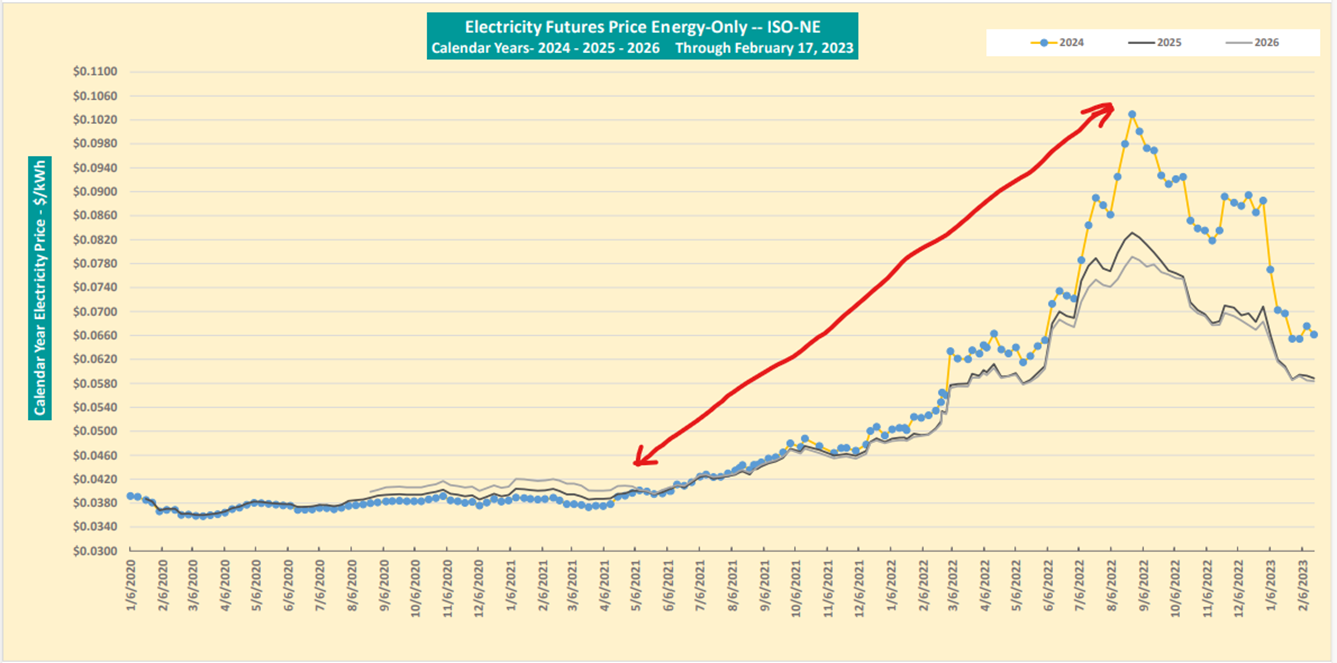Inside this Edition of the Freedom Energy Logistics Muni Minute
Freedom Energy Logistics | March 2023
Being proactive creates knowledge, and knowledge is very helpful!
Brian White, Municipal Program Director
On May 6, 2021, New England energy forwards began increasing after a long period of inactivity. The COVID-19 bubble had seemingly passed, and business was returning to normal. After 16 months of hardly any market movement, some volatility wasn’t exactly shocking.
Energy rates started going up, week after week, causing everyone to wonder when they’d plateau or begin to fall, especially after the summer of 2021 passed. After all, the Fall is the “best” time to buy, right? Instead of coming down, energy forwards surged for the next 16 months. Every day from May 6, 2021, to September 6, 2022, prices were higher than the previous day. As a result, utility rates hit all-time highs, some suppliers temporarily suspended pricing, and others pulled out of the New England market for good.
Energy managers were scrambling for ideas “how can they do this” was echoed in every conversation we had, but the reality is, there was no “they.” Rates were increasing because demand was growing, there were no solutions to combat our rising dependency on natural gas, Russia started a war, and the United States became the world’s largest exporter of Liquified Natural Gas.
Electricity and Natural Gas forwards trade well into the future, so they can be purchased well before they’re needed. We encourage our municipal clients to start the renewal process about 24 months ahead of the contract expiration, implementing your overall strategy in the process. Reviewing executable offers helps you plan for the future; it allows you to track price movement in real time and discuss the best path forward with everyone involved. With so many Massachusetts towns committed to reducing greenhouse gas emissions, the market increase made it almost impossible to consider purchasing additional green power if your agreement expired in 2022 unless you purchased early.
What can we learn from this? There is power in information and asking questions. To ensure our clients are well informed, Freedom Energy prepares a bid summary detailing the similarities and differences between offers and makes recommendations. There’s no charge or commitment to review these offers or use our services to monitor and report back.
Our team can help reduce surprises during the energy procurement process for municipalities.

What can municipalities do to become more efficient?
Dileep Prabhakar, Regional Sales Director
Municipalities are under tremendous pressure from their residents to become cleaner and greener. Many municipalities have taken advantage of the various on-site and net metering opportunities available, but you may be wondering what else you can do? Here is a handy checklist of things you could investigate:
- Do you need a new HVAC System? Look into heat pumps to replace an old system. A new heat pump system can heat and cool spaces much more efficiently, especially in the winter, as you need less oil or natural gas to heat spaces. The IRA has created several incentives for heat pumps.
- Is your hot water system going? You can replace it with a heat pump water heater. Older hot water systems that use oil or natural gas most likely need an upgrade. Heat pump water heaters can heat buildings without fossil fuels and bring communities closer to net zero.
- Consider replacing old school buses with electric school buses. The Mass DOER has incentives for this, and electric buses replace the gas powered ones currently in use.
- Take advantage of battery storage systems that help municipalities financially by reducing capacity and pollution by keeping older, dirtier plants offline.
Avoiding headaches when dealing with hundreds of accounts.
Jim Fagan, Senior Energy Advisor
Municipalities often deal with hundreds of different accounts, which can come with many challenges, including:
- Adding and removing properties.
- Moving town building locations.
- Managing properties with varying contract start dates.
Freedom Energy can assist in reducing or eliminating some of these challenges through our unique relationship with suppliers. We help municipalities by:
- Negotiating add/delete account language into our supply agreements.
- Providing account enrollment memos to ensure every account is enrolled at the start date of the agreement.
Benefits of add/delete language
Most suppliers are willing to include addendums that allow a customer to add or delete from 10% to 25% of the total aggregate load during the contract term. While the cost of this fee varies based on the supplier and the total load, it’s short dollars for maximum flexibility. For example, a municipality that uses around 5,000,000kwh/year will likely pay an added premium of $.0001kwh for 10% embedded within the energy rate. We have found that it is becoming increasingly common for some clients to include up to an additional $.0003kwh for the 25% add/delete language, given the flexibility it gives them through the duration of a three or four-year agreement.
A typical example is a Town Administrator who may also function as the property manager, responsible for over 100 total accounts. The Town Administrator signs a four-year fixed contract with the add/delete language included. Suppose a new property is added to their portfolio at any time within the four-year contract period, and that account does not exceed 10%, 20%, or 25% of the originally contracted load. In that case, they can add that account at the same rate, regardless of the state of the market. When the add/delete is included, there are no additional headaches dealing with which accounts are contracted where. Clients can be at peace knowing they have the contract flexibility to handle these inevitable changes.
Conversely, it is equally as essential when it comes to removing accounts. Over time, accounts will inevitably close, shut down, or move. Rather than dealing with early termination fees for one account after the next, the add/delete language acts as an insurance policy. Early termination fees are no longer applicable for accounts within the threshold. Freedom Energy advises municipal clients to including this language.
Benefits of account enrollment memos
Municipalities often have many properties, which results in many accounts. Our team works with suppliers to ensure all accounts are listed at the contract’s start. We accomplish this by providing account enrollment memos to our clients and following up with the supplier. A month before the contract start date, we confirm the accounts with clients and communicate any updates with the supplier to ensure enrollment in the coming month.
With the current volatility in the energy market, ensuring start dates are met is vital. For example, during Spring 2022, our team signed accounts for clients with Fall 2022 start dates. At that time, the rates were contracted between $0.11/kWh and $0.12/kWh. If accounts were missed for that fall/winter start date, those accounts would get put on holdover rates at $0.30/kWh or higher. Depending on which accounts were missed, this can cost clients thousands of dollars. Although this presents additional work with our clients and the suppliers, the attention to detail is vital when dealing with as many accounts as municipalities are.
Dealing with hundreds of accounts has its challenges, but Freedom Energy advocates for you, streamlines the process, and makes it as painless as possible along the way!
DOE Clean Energy Funding through the EECBG Program: Opportunity for Municipalities
The U.S. Department of Energy’s Energy Efficiency and Conservation Block Grant (EECBG) Program offers more than $3 million in formula funding to municipalities with populations of more than 35,000. It’s designed to support local governments in their efforts to cut carbon emissions, improve energy efficiency, and reduce energy use. Created by the Bipartisan Infrastructure Investment and Jobs Act, the program supports the Biden Administration’s goal of achieving a carbon-free electric grid by 2035 and a net zero emissions economy by 2050. The MA DOER is also responsible for administering an additional $2.49 million for smaller municipalities with populations less than 35,000 in the Commonwealth. For more information about grant opportunities, view a recording of the DOE’s webinar for local governments here and presentation slides here.
Note: the Pre-Award application deadline is April 28, 2023.









Connect With Us